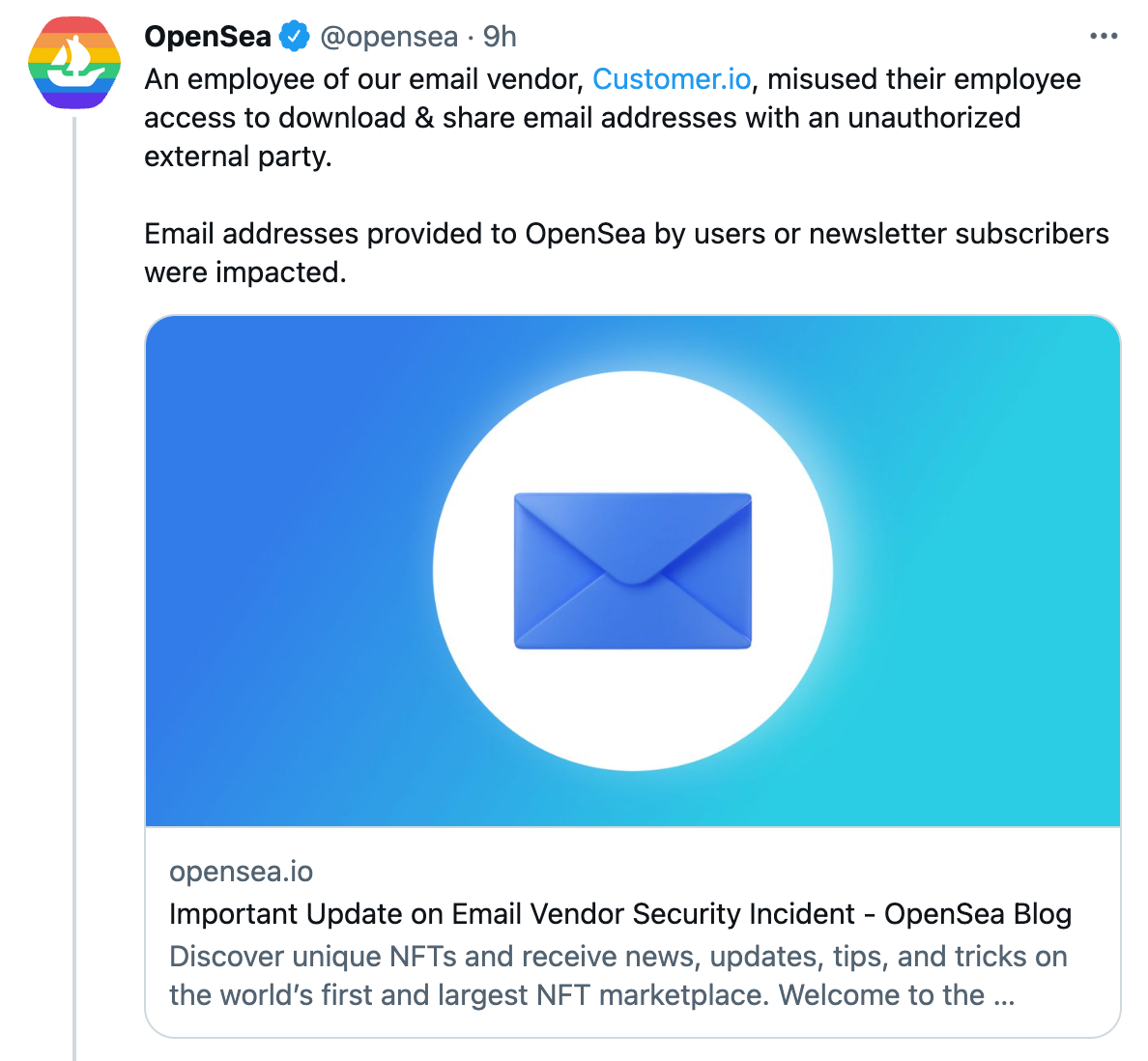OpenSea Breach Exposes 1.8 Million Email Addresses. How does it affect you?

Often dubbed the Amazon of NFTs, OpenSea the biggest non-fungible token marketplace in the world, with an estimated value of 13 billion dollars and more than 1.8 million users, has reported a security breach that resulted in the leak of all user e-mail addresses.
According to OpenSea representatives, a staff member at Customer.io, an OpenSea email vendor contractor, had downloaded the email addresses of all users, past and present, and sold them to a third party.
It’s not yet clear if other user personal information was also exposed but, as OpenSea stated in its announcement:
“If you have shared your email with OpenSea in the past, you should assume you were impacted.”

While disgruntled employees looking to make a profit and supply chain vulnerabilities are nothing new, the recent interest in NFTs and the huge sums being flung around are a novelty. Moreover, they caught the eye of cybercriminals, scammers and malicious actors of all kinds. That’s why, if you were an OpenSea user and your email address was exposed, you should be extra careful. Here’s what you should do:
Watch out for phishing messages and scam attempts. As you probably already know, some bad actors will do anything to get your NFTs and your money. For example, after the OpenSea Discord server was hacked in May, a massive wave of phishing attacks ensued. Now, history is likely going to repeat itself, especially as some users are already reporting an increase in spammy emails, messages and phone calls.
- Watch out for emails from domains that look similar to OpenSea.io or OpenSea.xyz.
- Be wary of emails prompting you to change your password or update your personal information
- Watch out for calls in which purportedly official representatives are asking you for more information, or personal details
- Stay on the lookout for failed login attempt notifications
- Be extra careful with suspicious links you receive via email or social media
- Don’t enter your credentials on pages you open via links, instead open a new browser window, and navigate manually to that login page.
- Most importantly, don’t underestimate social engineering. Even if you think you’ve seen everything when it comes to online scamming, you still might be surprised.
Review your security options. With only your email address, bad guys can’t inflict too much damage directly. Sure, they can suffocate you with spam, and send phishing messages, but that’s about it. However, if you attack a weak password to that email address, things can go south very quickly. They can hijack your email account along with many other connected accounts.
- If don’t already use strong passwords, consider changing them right know. Any password that’s less than nine characters long and doesn’t feature a combination of lower and uppercase letters, numbers and special characters can be brute forced instantly. Moreover, using common passwords like “123456”, “qwerty” or “password” isn’t going to stop anyone from accessing your accounts. Bitdefender Password Manager is a useful service that relieves you of the burden of coming up with and remembering hundreds of long passwords. It generates strong, unique, random passwords for all your accounts and safely stores them in an encrypted environment. Everything is easily accessible, even offline, with the help of a single master password.
- Activate multi-factor authentication on your accounts. According to Microsoft research, 99% of account hijacking can be prevented just by adding an extra authentication factor.
Keep track of your digital identity. Regrettably, this isn’t the first or the last time your email address will be leaked on the internet. Chances are it’s already been involved in other data breaches, along with other sensitive personal information like your name, phone number, address, Social Security number, and maybe even your credit card information. But knowing your data was leaked isn’t enough if you can’t do anything about it. Fortunately, there are tools that can help you. By using Bitdefender Digital Identity Protection, you can manage your digital footprint and see if any of your personal information has been exposed. Your email address is a good starting point for that. Moreover, because a quick response is critical, DIP (Digital Identity Protection) constantly scans the dark web for stolen credentials, so if one of your passwords ever surfaces online, you will know in real-time, so you can act and protect your identity.
tags
Author

Radu is a tech-geek with 15 years of experience in writing, journalism and copywriting. When he’s not writing he’s probably taking something apart, trying to figure out how things work.
View all postsRight now Top posts
Start Cyber Resilience and Don’t Be an April Fool This Spring and Beyond
April 01, 2024
Spam trends of the week: Cybercrooks phish for QuickBooks, American Express and banking accounts
November 28, 2023
3 in 5 travel-themed spam emails are scams, Bitdefender Antispam Lab warns
August 10, 2023
FOLLOW US ON SOCIAL MEDIA
You might also like
Bookmarks








